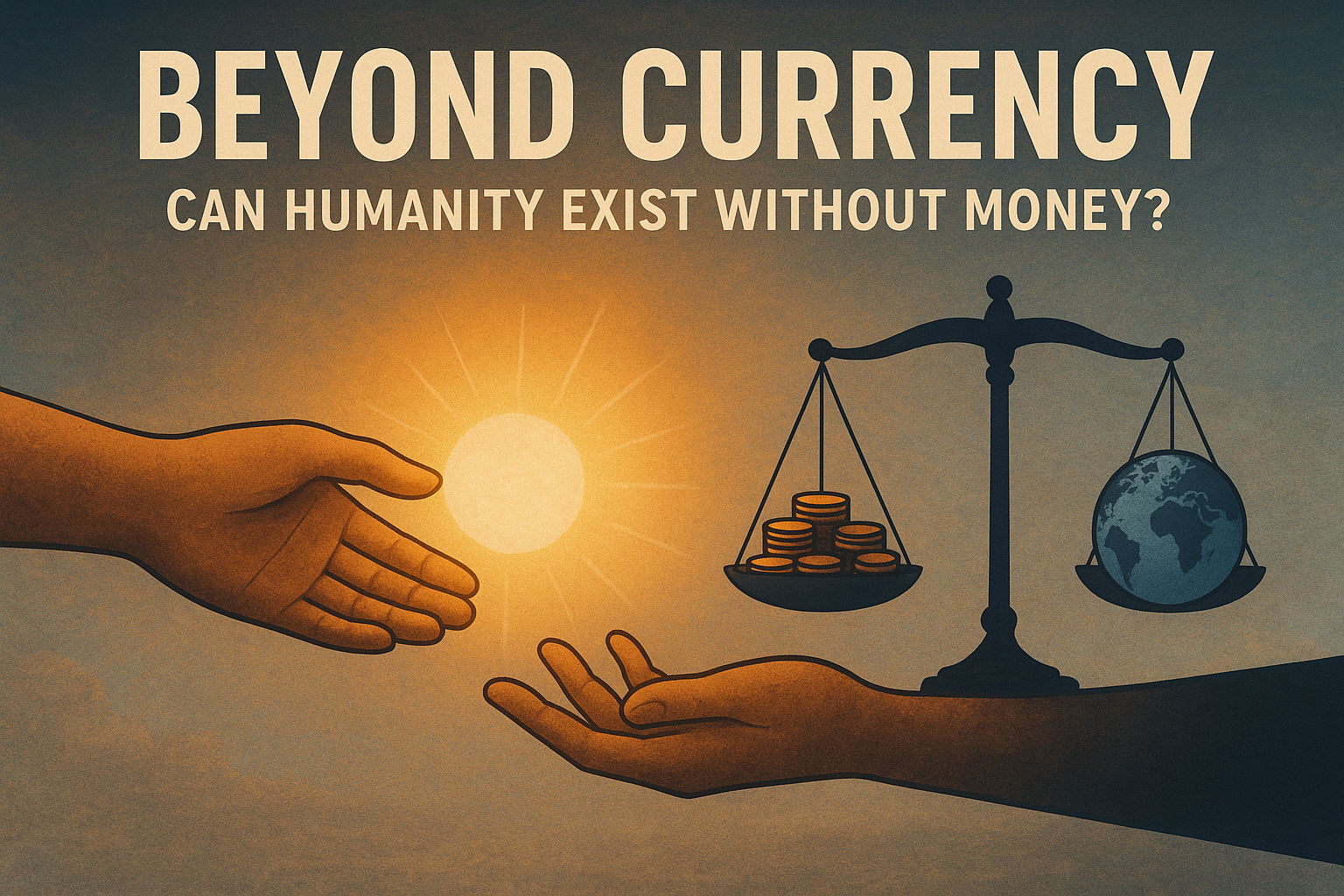Introduction
Thank you for reading this post, don’t forget to subscribe!Money is one of humanity’s most influential inventions — yet, paradoxically, it is nothing but paper, metal, or digits on a screen. Why, then, does it hold such immense power over our lives? Every human activity today, from survival to luxury, seems to orbit around money. But is this dependence natural or constructed? Could we imagine a world where wealth doesn’t define worth — where life flows not through currency but through compassion and cooperation?
This question isn’t just philosophical — it’s fundamental to understanding who we are as a species and where we’re heading.
Why Is Money Required for Living?
In modern society, money has become the universal medium of exchange — a bridge between human needs and resources. We use it to buy food, shelter, education, and everything necessary for survival and comfort.
However, money itself doesn’t feed, clothe, or heal us — it only represents value. It symbolizes trust, exchange, and effort.
Without money, we would have to return to direct barter — trading one good or service for another — which is inefficient in large, complex societies. Money, therefore, simplified human interaction by introducing a standard measure of value and enabling people to specialize in different skills.
The Emergence of Money and Wealth
1. The Barter Beginnings
Before money, early humans exchanged goods — grains for meat, tools for cloth. But barter had limitations: it required a double coincidence of wants — both parties needed what the other had.
2. The Birth of Currency
To overcome this, societies began using commodities with perceived value — shells, salt, gold, and silver — as early forms of currency. Eventually, governments and authorities started minting coins and printing notes, backed by trust in their legitimacy.
3. The Evolution to Digital Wealth
Today, money has transcended its physical form — cryptocurrencies, credit systems, and digital banking have made it almost abstract. It now represents information and trust in digital networks rather than tangible wealth.
Can We Imagine a Society Without Money?
A society without money is difficult, yet not impossible, to imagine. Some philosophers, visionaries, and thinkers — from Karl Marx to Jacque Fresco’s Venus Project — have envisioned post-monetary societies based on equality, technology, and shared resources.
In such a society:
- Resources would be distributed based on need, not purchasing power.
- Work would be motivated by passion, not profit.
- Technology could ensure abundance, reducing human competition.
- Human worth would be measured by contribution and character, not wealth.
While idealistic, such systems would require profound transformation — replacing greed with gratitude, and competition with compassion.
If Money Didn’t Exist – What Would Society Look Like?
Imagine a world where there are no banks, no salaries, no prices.
- Education and healthcare would be free and accessible to all.
- People would contribute based on skills, not status.
- There would be cooperative living, shared resources, and collective responsibility.
- Creativity and empathy would replace economic ambition as the driving forces of human life.
However, it also poses challenges:
- Without incentives, productivity might decline.
- Resource allocation could become chaotic without a standard value system.
- Power struggles might emerge over control of resources instead of currency.
Thus, while a moneyless world seems utopian, it demands a level of consciousness and morality humanity hasn’t yet achieved collectively.
The Impact of Money on Humanity: Boon or Bane?
Positive Impacts (Pros)
- Economic Growth & Development: Money enabled trade, industry, and technological progress.
- Social Mobility: Individuals can rise above their circumstances through skill and effort.
- Standardization of Value: It simplified trade and stabilized societies.
- Incentivized Innovation: The pursuit of profit has driven creativity and invention.
Negative Impacts (Cons)
- Inequality & Exploitation: Wealth concentration has created vast social and economic divides.
- Loss of Humanity: The pursuit of money often overshadows empathy, ethics, and relationships.
- Environmental Degradation: Greed-driven industries have exploited natural resources beyond repair.
- Stress & Mental Health Issues: Financial pressure is one of the leading causes of anxiety and depression.
Money is a tool — not inherently good or evil. Its impact depends on how we use it and what we value more — possession or purpose.
Humans: The Only Species Obsessed with Wealth
No other creature on Earth has created a concept of wealth, property, or currency.
Animals live within natural cycles — they take only what they need, waste nothing, and give back to the ecosystem.
Humans, however, invented ownership — transforming nature’s gifts into assets, and community into competition.
Our intelligence gave us the power to create systems — but also the temptation to dominate them. Money, thus, reflects both our brilliance and our bondage.
Where Are We Heading as a Civilization?
We are standing at a crossroad — between material progress and moral regression.
Technology has given us abundance, yet billions still live in poverty.
We chase virtual wealth, forgetting real human connection.
Perhaps, the time has come not to abandon money, but to redefine wealth —
to measure richness not in currency, but in compassion, creativity, and contribution.
A truly evolved society will not be one that eliminates money,
but one that ensures it serves humanity — not enslaves it.
Conclusion: The True Currency of Life
Money was created to help humanity — not to rule it.
The richest person is not the one with the most possessions,
but the one whose life is filled with purpose, peace, and positive impact.
As we advance into a digital, interconnected world, let us remember:
The ultimate wealth lies not in what we own, but in who we are.

Leave a Reply